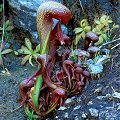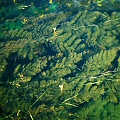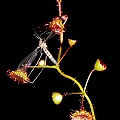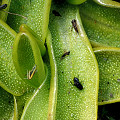Q: Will carnivorous plants control my bug populations?

Darlingtonia

U. foliosa

One bug down,
1,000,000 left

Seven more down,
999,993 left
A: A pair of questions I get frequently are:
- Will carnivorous plants control the mosquitoes that plague my yard?
- Will carnivorous plants eat the flies in my house (or horse stall!)
Sorry, but carnivorous plants are not your answer for either of these questions.
First, the mosquito issue. Carnivorous plants just do not attract mosquitoes.
Carnivorous plants have sugary nectars that attract insects that like sugar: flies, moths,
butterflies, etc. Certainly, the occasional misguided mosquito may get caught,
but the plants will not make a dent into your insect plague. Indeed,
growing carnivorous plants might even worsen your
mosquito problems because you must grow these plants with lots of water. Trays
filled with water are great mosquito breeding grounds, comprende?
If you have an occasional housefly, a well-placed carnivorous plant may help
(my prescription: a few Drosera capensis plants),
but usually the people who have so many flies that they are looking for weird
solutions like Venus flytraps have far too many bothersome flies harassing them
for a few plants to do the job. If you are trying to get rid of the flies in
your stables, definitely look to some other approach. Fly-bags at tack stores
are a much better bet for you.
Also, remember that most people find they must
put a lot of energy into trying to grow
these bizarre plants, and even then may
still fail to keep the plants alive. A carnivorous plant casually tossed
into the corner of a shoproom or barn stall will surely die of neglect.
Orchid growers sometimes keep a few flats of large Mexican Pinguicula in their
greenhouses, alongside their prized orchids. Apparently, the Pinguicula are useful in
capturing fungus gnats. In this case, the Pinguicula are not serving as a very important
control method; rather they are being used as sentinals for increasing populations of fungus gnats.
Long ago I read that some people or agencies have tried introducing
the aquatic carnivore Utricularia into ponds where mosquitoes breed. It was not succesful (not too much of
a surprise there), but I haven't been able to find the reference for this study. However, do not introduce
Utricularia yourself, because it could turn into an invasive weed
that would cause more ecological harm than you intended. Barthlott et al. (2007) notes that
Utricularia have been tried as controls for mosquitoes that carry certain diseases, but I have not
read the source papers.
Page citations: Barthlott, W. et al. 2007;
Pulver, E. 2008 (personal communication); personal observations.